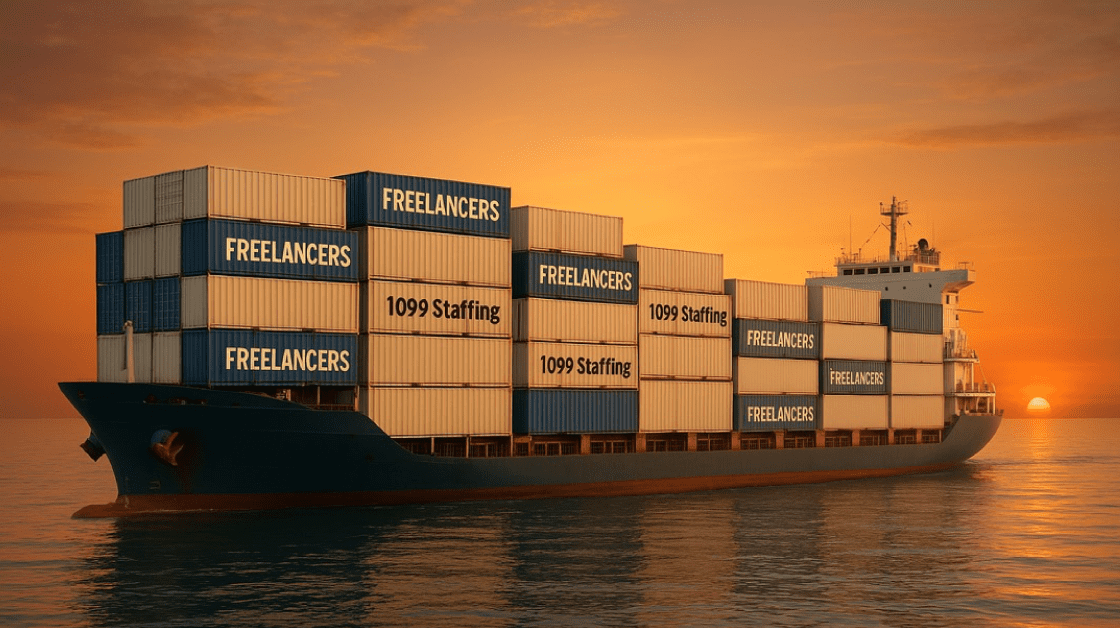
When your supply chain gets taxed, your workforce doesn’t have to.
It started with an email.
Subject line: Urgent: Tariff Changes Affecting Your Shipment.
Your morning coffee suddenly tastes like despair. That container of widgets you’ve ordered for years? The duties just jumped from a manageable $2,000 to a migraine-inducing $12,000. And just like that, your budget has all the structural integrity of a wet paper bag.
If that sounds familiar—or terrifyingly plausible — you’re in good company. Business leaders everywhere are being whiplashed by a geopolitical climate that shifts like sand. Between new tariffs, rising inflation, and whispers of recession, company roadmaps are looking less like spreadsheets and more like choose-your-own-adventure novels.
But here’s the silver lining: while global supply chains are getting more expensive and less predictable, your workforce doesn’t have to follow suit. In fact, it might be time to double down on a different kind of agility — the kind that doesn’t sit in shipping containers.
The World Just Got Pricier — Fast
Let’s get real: 2025 has been a year of economic plot twists. The U.S. recently implemented tariff changes and ramped up duties on a range of imported goods — everything from electric vehicle batteries, semiconductors, medical equipment, to steel products and “imported widgets” used by thousands of businesses across the U.S. The goal? Reinforce domestic manufacturing. The reality? Supply costs are skyrocketing, especially for small and mid-size businesses.
According to Business Insider, a single tariff increase pushed one company’s duties from $3,000 to $54,000 overnight. Is that a possibility for you? These days, who knows?
While Fortune 100 companies can afford to weather policy swings with armies of consultants and contingency budgets, most growing businesses don’t have that luxury. They’re forced to make fast pivots. Business owners are deciding between cutting costs, streamlining ops, and freezing hiring… or all of the above — some have to do all of that all before the end of next quarter.
And when the budget axe swings? It’s frequently staffing that gets hit first.
From Cost Crunch to Smart Staffing
Here’s the paradox: companies are trimming headcount to conserve cash, but the work itself? That’s not going anywhere. Customer expectations are still high, deadlines are still looming, and innovation doesn’t exactly hit pause just because the economy coughs or sneezes.
That’s why more business leaders are quietly shifting from full-time hires to on-demand freelance talent — not as a panic move, but as a smarter way to maintain momentum without the fixed costs.
Full-time hires are like owning a car. Freelancers? More like calling a ride when you need one. Still gets you where you’re going — but without the monthly payments, oil changes, and insurance premiums.
Here’s how agile companies are making it work:
- Marketing campaigns are being driven by fractional strategists and creative contractors.
- Product pivots are powered by freelance devs and UI designers who drop in for sprint cycles.
- Back-office gaps — from finance to HR — are filled with senior-level freelancers who can do in 10 hours what a full-timer might do in 40.
And yes, the math usually works in your favor. Freelancers tend to run 30–50% cheaper overall when you account for benefits, training, and time-to-productivity.
Freelancers: Your Secret Supply Chain Hack
When we think about supply chain resilience, we usually picture ports, trucks, and warehouses. But there’s another kind of supply chain companies rely on—people. And in 2025, the workforce supply chain is just as vital to future-proofing your operations.
Freelancers give you flexibility without friction:
- No onboarding bottlenecks.
- No long-term commitments during uncertain times.
- No “we need help, but we can’t afford another full-time salary” stress.
You get elite-level expertise on demand, precisely where you need it — and only for as long as you need it.
Some companies are even shifting entire business units to a more modular, freelance-first approach. Think of it like moving from fixed manufacturing lines to 3D printing: nimble, scalable, and far more responsive to sudden changes.
Talent Doesn’t Pay Tariffs
And here’s the kicker: knowledge work isn’t bound by geography. Your favorite product designer is 2,500 miles away? Not affected by new U.S. import tariffs. That killer content strategist in Chicago? Not only are they exempt from tariff changes, with tech-based communication platforms, they feel like they’re just one cubicle over.
When physical goods get expensive, companies start rethinking how and where they build—and the same logic applies to teams. Freelancers let you access a global talent pool without any of the red tape, customs forms, or overseas delays. You can source the exact skillset you need, from wherever it’s most available and affordable.
Flexible talent is global, borderless, and — increasingly — a key part of any company’s competitive strategy.
In other words, you don’t need to limit your options to the zip code of your office building or the visa status of an applicant. You can scale your team the same way you scale your cloud infrastructure: efficiently, affordably, and on demand.
So… What Now?
Here’s the tough truth: we may be in for even more tariff changes — adding more or walking some back and taking duties away? Whatever happens, it is bound to be a bumpy economic ride over the next few years. But you don’t have to freeze in place — or gamble with bad hires — in the name of caution. The smarter path forward is one of intentional flexibility.
Ask yourself:
- Where are we stretched thin, but hesitant to hire?
- What roles could benefit from short-term, high-impact support?
- How do we build a workforce strategy that bends, not breaks?
This is where FlexTal comes in. We match business leaders with elite, pre-vetted freelancers who don’t just fill seats — they accelerate momentum. Our Customer Success Managers get to know your needs, your goals, and your pain points — and help you build a custom bench of talent that evolves with you.
So while the world keeps throwing curveballs, your team can keep hitting line drives.
Let’s Build Something Flexible
Ready to pivot smarter?
Talk to a FlexTal Customer Success Manager and start your Talent Match today.
Because even if the economy’s unpredictable, your next great hire doesn’t have to be.
Chris is the President & COO of FlexTal. He brings 20+ years of experience in Customer Success, UI/UX, design, and marketing – including time within start-ups, agencies, and enterprise orgs. Chris has also served as a University adjunct professor in Advertising & Public Relations for several years.



